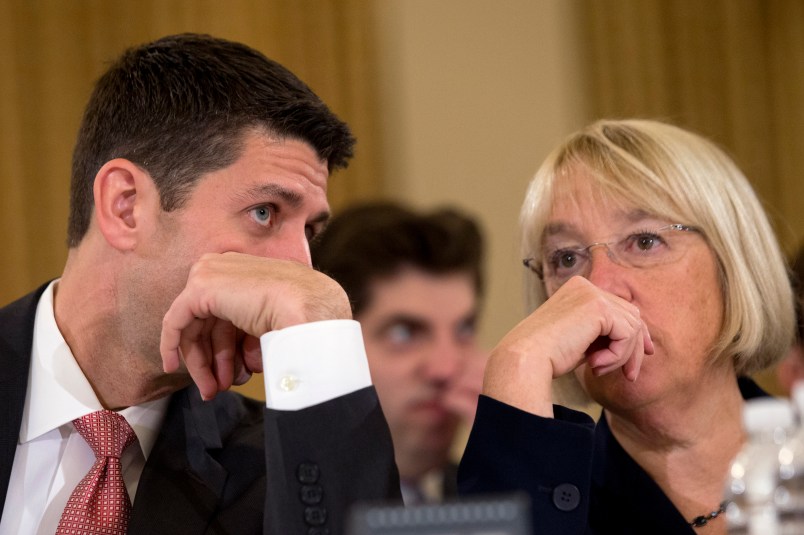House Budget Chair Paul Ryan (R-WI) and Senate Budget Chair Patty Murray (D-WA) met Wednesday in the Capitol to advance their private negotiations on a modest budget agreement to set spending levels for the next two or three years.
The deal, which could still fall apart, is aimed at mitigating the pain of the automatic across-the-board sequester cuts with a mix of targeted reductions to discretionary spending and new non-tax revenues via higher government fees and asset sales. Their offices were mum on details after the meeting — a sign that negotiations remain serious.
“[Chairwoman] Murray and Chairman Ryan continue to talk and she is hopeful they can keep making progress and can reach a bipartisan deal by the deadline,” said Eli Zupnick, a spokesman for Murray.
A top priority is to establish a spending level for the next few years. The sequester sets spending next year at $967 billion. Ryan and Murray are closing in on a level around $1 trillion, according to sources familiar with the talks. Republicans prefer it to be lower, at $990 billion or a bit less, while Democrats want it to be higher, between $1 trillion and $1.058 trillion, the level called for in their Senate-passed budget proposed by Murray.
The revenue raisers are fluid. Options that Ryan and Murray have discussed include higher fees for airline ticket purchases and the sale of wireless spectrum. Sources say it’s unclear what will make it into a final agreement. The two are keeping the negotiations very private, even from other lawmakers on the budget conference committee, let alone rank and file members.
There are political landmines to the success of a deal, primarily House conservatives. The Budget Control Act calls for a spending level of $967 billion next year, and it won’t be easy to convince hardline conservatives to spend a penny more than that. The right views the sequester as its crowning achievement in the Obama era. House Republican leaders support the Ryan-Murray framework, but they’ve been burned by their right flank before. Defense hawks have been screaming about the military cuts and appropriators have been clamoring to write a budget, but their message hasn’t prevailed so far.
Ryan’s willingness to engage in serious negotiations, knowing the sequester cap would have to be lifted, points to signs of hope for a deal. And his strong conservative credentials could be an asset when it comes to selling skeptical members of his party on a deal.
Democrats, meanwhile, will likely fall in line behind any deal Murray strikes.
A mini-bargain that sets spending levels for the next few years would be a massive step forward for a Congress that has been paralyzed and lurching from one crisis to the next for three years. It would allow appropriators to finally return to writing budgets and remove the constant threats of government shutdown.
There would be no cuts to safety-net programs like Medicare or Social Security, a Republican goal, and no tax code revenue by closing loopholes, a Democratic goal.
A deal by the Dec. 13 budget conference deadline should give Congress just about enough time to flesh out spending bills by Jan. 15, when government funding expires again.






